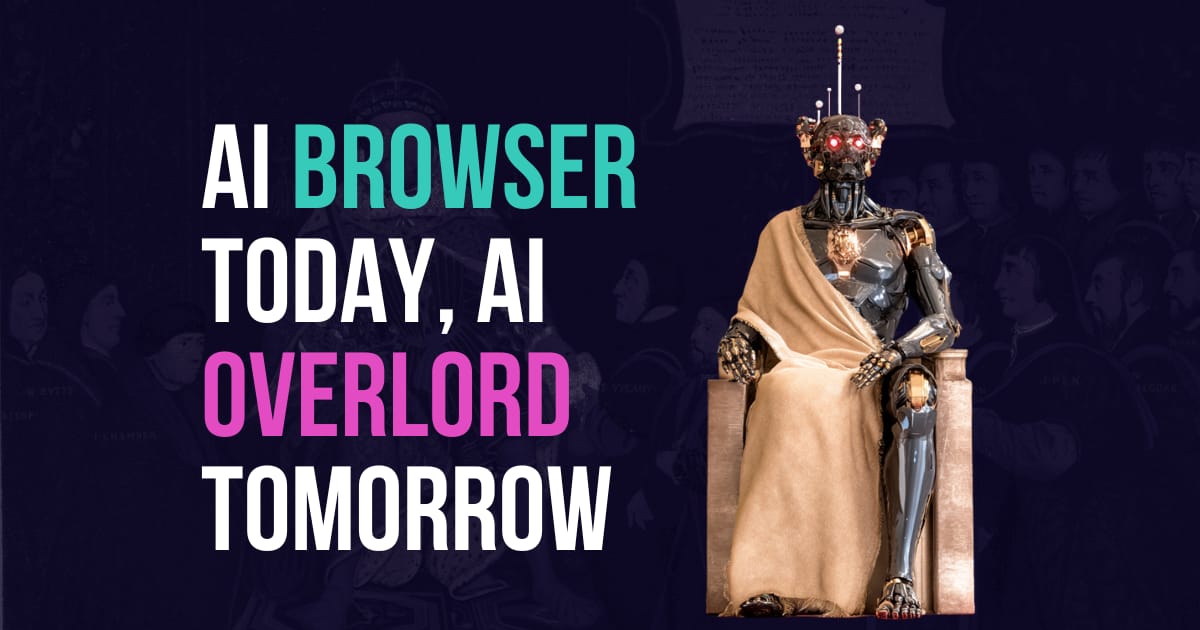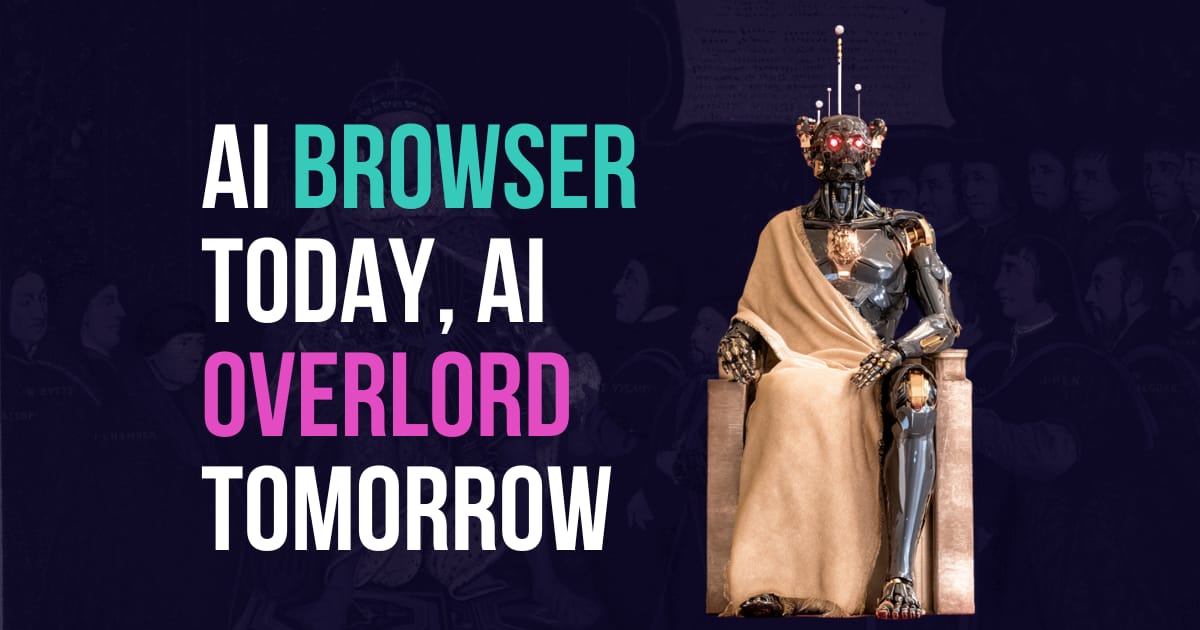- Enterprise AI Daily
- Posts
- Browsers Getting Brain Transplants
Browsers Getting Brain Transplants
How AI-native browsers from OpenAI, Perplexity, and Microsoft are redefining the web

Welcome back to your daily dose of enterprise AI intelligence. Today, we're diving into the Great Browser Awakening, where your trusty Chrome tab is getting replaced by something that thinks for itself. Plus: why EA's AI implementation is a cautionary tale for every enterprise, GM's billion-dollar bet on conversational cars, and China's open-source advantage that has Silicon Valley sweating.
Go from AI overwhelmed to AI savvy professional
AI will eliminate 300 million jobs in the next 5 years.
Yours doesn't have to be one of them.
Here's how to future-proof your career:
Join the Superhuman AI newsletter - read by 1M+ professionals
Learn AI skills in 3 mins a day
Become the AI expert on your team

Enterprise AI Group
The Rise of the AI Gateway
Remember when browsers were just windows to the web? Those days are as dead as dial-up. OpenAI launched ChatGPT Atlas last week , Perplexity rolled out Comet the week prior, and Microsoft transformed Edge with Copilot Mode, all racing to turn your browser from a passive portal into an active assistant. They’re not looking to outdo Chrome or Safari. Rather, they’re looking to redefine how we interact with the information itself.
Why They’re Different
Traditional browsers retrieve information while AI browsers actually reason with it. Instead of juggling 12 tabs and 3 half-read PDFs, these tools give you one coherent, contextualized answer that understands your intent.
They blend:
Search + chat + workflow in one environment.
Personalized knowledge layers that learn from your history and goals.
Context-aware reasoning that interprets what you meant, not just what you typed.
Who They’re For
For consumers, this means a faster, more intuitive web. For enterprises, this presents a classic innovation-versus-security dilemma. These browsers promise major productivity gains with features like persistent sidebars, multi-tab context awareness, and agentic capabilities that can complete complex workflows autonomously. Imagine your procurement team using an AI browser that automatically compares vendor proposals across multiple tabs, fills RFPs, and schedules follow-up meetings in real time.
But here's what should keep enterprise IT teams up at night: these AI browsers don't just read pages, they can click buttons, fill forms, access your email, calendar, and connected services. It’s like giving your intern the keys to your digital kingdom, except this intern works at the speed of light and never forgets anything.
What They Mean For The Future
Cybersecurity experts discovered that Perplexity's Comet browser suffered from "CometJacking" vulnerabilities where a single malicious URL could exfiltrate emails, calendar data, and connected service information through indirect prompt injection attacks. Even OpenAI's chief information security officer, Dane Stuckey, admitted that "prompt injection remains a frontier, unsolved security problem."
The security challenge runs deeper than any single vendor's bug. Brave, a privacy-focused browser founded in 2016, determined last week that indirect prompt injection attacks are a "systemic challenge facing the entire category of AI-powered browsers."
The fundamental problem: As McAfee's CTO Steve Grobman explained to TechCrunch, large language models struggle to understand where instructions are coming from. There's a "loose separation between the model's core instructions and the data it's consuming."
This architectural flaw means even the band-aid solutions feel inadequate. OpenAI's "logged out mode" neuters the browser's usefulness while Perplexity's real-time attack detection is playing whack-a-mole with an infinite game board. As Brave's Shivan Sahib put it: "There's a huge opportunity here in terms of making life easier for users, but the browser is now doing things on your behalf."
The trillion-dollar question for enterprises: how much autonomy do you give a tool that can't reliably tell the difference between your instructions and a hacker's?
And the data implications are equally massive. "Getting the bounce rates, how they scroll, all of that" gives these companies unprecedented user behavior insights, as Funnel's János Moldvay notes. For companies like OpenAI and Perplexity, "what they really need and what they're really after... is the interaction of users with the content."
The strategic play here isn't subtle. As Enders Analysis points out, "Owning the browser itself is one way of securing the place of your search product, and all the benefits that go with that (including to your ads business)." Translation: control the interface, control the revenue stream. OpenAI's browser move is part of a larger platform play; they're building app stores, shopping integrations with Walmart, and even hardware with former Apple designer Jony Ive. This isn't just about better browsing; it's about owning the entire digital experience stack.
The AI gateway is becoming the new digital operating layer, where work, knowledge, and decision-making converge. Enterprise teams need to start asking hard questions now:
What data leaves our network when employees use AI browsers?
How do we enforce security policies on agentic browsing?
Which vendor relationships need updating for this new paradigm?
For consumers, AI browsers mean a faster, more intuitive web. For enterprises, they're both an opportunity and a minefield, promising unprecedented productivity while introducing security and data governance challenges we're only beginning to understand.
Don’t get SaaD. Get Rippling.
Software sprawl is draining your team’s time, money, and sanity. Our State of Software Sprawl report exposes the true cost of “Software as a Disservice” and why unified systems are the future.

Enterprise AI Group // Created with Midjourney
AI News to Know
When AI Creates More Work Than It Saves
Electronic Arts' attempt to integrate AI into game development is backfiring spectacularly, with staff reporting that AI tools produce flawed code and hallucinations that need constant correction. Employees are openly mocking leadership on Slack with memes about CEOs wanting AI "right now" despite not knowing what to do with it. Sound familiar? A recent Dayforce survey found 87% of executives use AI daily compared to just 27% of workers, proving that enthusiasm at the top doesn't automatically translate to adoption below.
GM's $127K Bet on Conversational Cars
General Motors is partnering with Google to integrate Gemini AI into future vehicles, starting with the $127,000 Cadillac Escalade IQ EV in 2028. Beyond just voice commands, GM promises cars where drivers can "take their hands off the wheel and eyes off the road" thanks to centralized computing and LiDAR.
China's Open Source Dominance Rattles Silicon Valley
"It's really China's game right now" in open-source AI, warns Andreessen Horowitz partner Anjney Midha, citing DeepSeek's R1 model that matched U.S. frontier models at a fraction of the cost. DeepSeek's latest breakthrough found that processing information as visual tokens rather than language tokens makes models 10 times more efficient.
TL;DR:
The Browser Renaissance is here. OpenAI, Perplexity, and Microsoft are racing to control how we interact with the web, but massive security vulnerabilities remain unsolved.
EA's AI implementation disaster shows what happens when C-suite AI enthusiasm meets ground-floor reality: tools creating more work, not less.
GM's Google partnership signals automotive AI going mainstream by 2028, with implications for fleet management and enterprise mobility.
China leads open-source AI with DeepSeek's efficient models, forcing even OpenAI to pivot strategy and release open-weight alternatives.
Enterprise action items: Update browser security policies, pilot AI tools with actual users (not just execs), and factor geopolitics into your AI vendor selection.
The Bottom Line
The Age of Intelligent Browsers isn't about tabs and bookmarks, it's about who controls the AI layer between you and the internet. While OpenAI and friends promise productivity paradise, the reality is messier: unsolved security vulnerabilities, adoption resistance, and a geopolitical chess match playing out in your tech stack.
Smart enterprises will treat AI browsers like any transformative technology: pilot carefully, secure aggressively, and remember that the most enthusiastic executive demo rarely reflects Monday morning reality. Because if EA's experience teaches us anything, it's that forcing AI on unwilling teams is a recipe for Slack memes, not productivity gains.
Stay sharp,
Cat Valverde
Founder, Enterprise AI Solutions
Navigating Tomorrow's Tech Landscape Together

